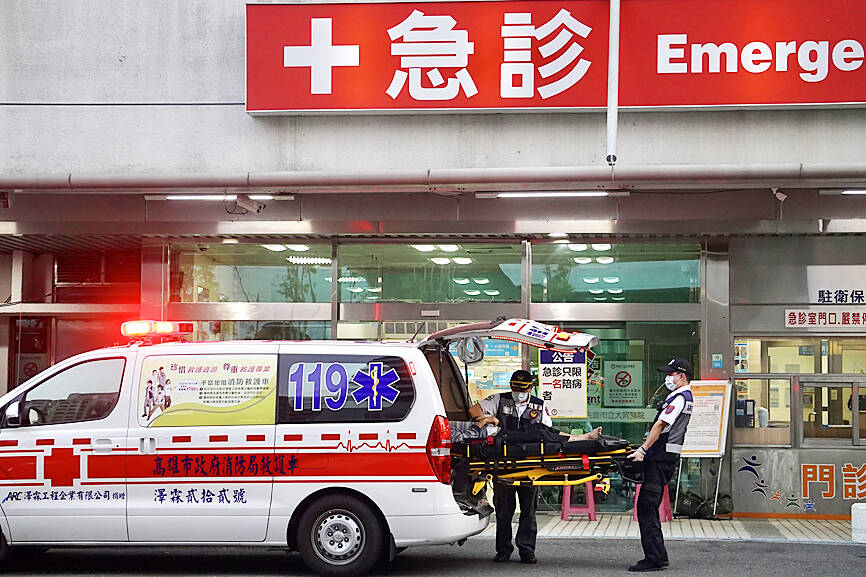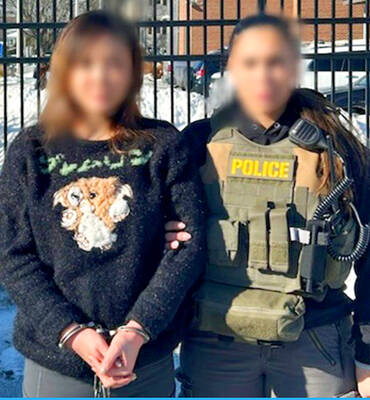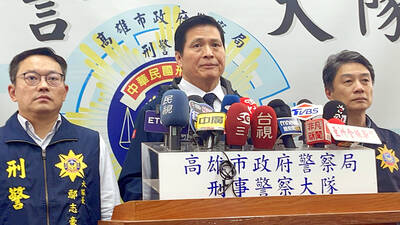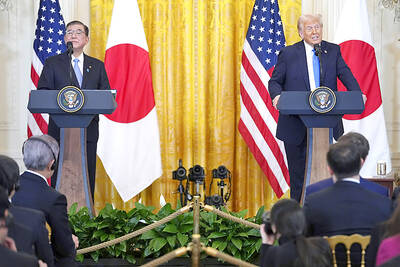The government is planning to keep the National Health Insurance (NHI) premium rate at 5.17 percent next year, as a reserve fund could be set aside to sustain the NHI system for about one month.
The conclusion was reached in a meeting of the National Health Insurance Committee on Wednesday, which also discussed the scope of medical benefits that would be covered next year.
“Before setting the health insurance premium rate, the committee will first calculate the revenue based on the expenditure and consider a potential increase in the budget for the National Health Insurance system in the next few years. Then we will consider whether the revenue will be sufficient to set aside a reserve fund that can sustain the National Health Insurance system for at least one month,” National Health Insurance Administration (NHIA) Director-General Shih Chung-liang (石崇良) told reporters on the sidelines of an event on health education.

Photo: CNA
“The committee estimated that if the health insurance expenditure increases to 4 percent next year, a reserve fund can be set aside to pay healthcare expenses for another 1.01 months. This means that the premium rate should remain at 5.17 percent,” Shih said.
The committee said that its recommendations would be sent to the Executive Yuan for approval.
The committee would begin negotiating next year’s budget for the NHI system in September and deliberating the premium rate in November, given that the Cabinet approved its recommendations, it said.
The NHIA would also review a list of over-the-counter drugs paid by the NHI system to address a drug shortage and reduce waste, Shih said.
Drugs prescribed to children and for public health purposes would be given priority considerations when the NHIA reviews the list, Shih added.
NHIA Deputy Director-General Tsai Shu-ling (蔡淑鈴) said that the NHI system pays about NT$2 billion (US$65.13 million) for over-the-counter drugs per year.
“We are expected to address the issue faster, even though the types of over-the-counter drugs paid by the NHI system have been reduced from more than 1,300 to 800,” she said.
The NHIA aims to control the insurance payment for over-the-counter drugs, Tsai said.
Aside from conducting a comprehensive review of clinical drugs, the NHIA would consult the Food and Drug Administration to ascertain the types of drugs that require prescriptions and detailed instructions, and determine whether they should be categorized as prescription or nonprescription drugs, the agency said.
The NHIA would also propose amendments to drug regulations to ensure that certain over-the-counter drugs could be covered, she said.

Johanne Liou (劉喬安), a Taiwanese woman who shot to unwanted fame during the Sunflower movement protests in 2014, was arrested in Boston last month amid US President Donald Trump’s crackdown on illegal immigrants, the Criminal Investigation Bureau (CIB) said yesterday. The arrest of Liou was first made public on the official Web site of US Immigration and Customs Enforcement (ICE) on Tuesday. ICE said Liou was apprehended for overstaying her visa. The Boston Field Office’s Enforcement and Removal Operations (ERO) had arrested Liou, a “fugitive, criminal alien wanted for embezzlement, fraud and drug crimes in Taiwan,” ICE said. Liou was taken into custody

ON PAROLE: The 73-year-old suspect has a criminal record of rape committed when he was serving in the military, as well as robbery and theft, police said The Kaohsiung District Court yesterday approved the detention of a 73-year-old man for allegedly murdering three women. The suspect, surnamed Chang (張), was arrested on Wednesday evening in connection with the death of a 71-year-old woman surnamed Chao (趙). The Kaohsiung City Police Department yesterday also unveiled the identities of two other possible victims in the serial killing case, a 75-year-old woman surnamed Huang (黃), the suspect’s sister-in-law, and a 75-year-old woman surnamed Chang (張), who is not related to the suspect. The case came to light when Chao disappeared after taking the suspect back to his residence on Sunday. Police, upon reviewing CCTV

TAIWAN ADVOCATES: The resolution, which called for the recognition of Taiwan as a country and normalized relations, was supported by 22 Republican representatives Two US representatives on Thursday reintroduced a resolution calling for the US to end its “one China” policy, resume formal diplomatic ties with Taiwan and negotiate a bilateral Taiwan-US free trade agreement. Republican US representatives Tom Tiffany of Wisconsin’s 7th Congressional District and Scott Perry of Pennsylvania’s 10th District were backed by 22 Republican members of the US House of Representatives. The two congressmen first introduced the resolution together in 2021. The resolution called on US President Donald Trump to “abandon the antiquated ‘one China’ policy in favor of a policy that recognizes the objective reality that Taiwan is an independent country, not

The US-Japan joint statement released on Friday not mentioning the “one China” policy might be a sign that US President Donald Trump intends to decouple US-China relations from Taiwan, a Taiwanese academic said. Following Trump’s meeting with Japanese Prime Minister Shigeru Ishiba on Friday, the US and Japan issued a joint statement where they reaffirmed the importance of peace and stability in the Taiwan Strait and support for Taiwan’s meaningful participation in international organizations. Trump has not personally brought up the “one China” policy in more than a year, National Taiwan University Department of Political Science Associate Professor Chen Shih-min (陳世民)